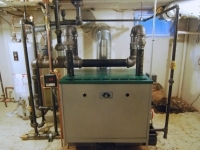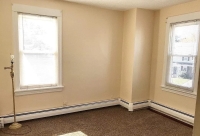No insurance for decommissioned oil tank?
FilmCarp said:
You can't get insurance for that tank.
This, as above, I am in exactly the same situation, and probably in this house until I die!
For more info, there is a huge old thread on this, maybe you can find it if you do a search.
We were in this same position until June, when we finally screwed up the courage to have our legally abandoned tank removed -- but I still share your frustration and outrage at being put in this position. I would never have allowed our family to be uninsured for a potential financial calamity -- and yet that was the position in which we found ourselves, through no fault of our own. You follow all the protocols and regulations and still wind up holding the bag. You are all correct: it isn't right! (Our results were not too bad, all things considered: some slight contamination, despite having been approved as clean when decommissioned -- 'just' 4 tons of soil removed.)
This is such BS! I should get into the soil remediation business. We also have a 'properly decommissioned tank' and will likely be here for ages. @iwasmim, how much did you end up having to pay to get that soil remediated?
Have you checked your homeowner's policy? If the policy was written before all the fuss about in ground oil tanks, there may be some form of coverage there.
I don't believe there is any coverage.
We just went thru this process too. First, I went to town to see what notes they had about our tank. Amazingly, but not surprising!, Mittermeier had a drawing of the location of the tank along with some notes (this from the late 1980's!). Then, I called the company who filled the tank with sand. Both Mittermeier and the company shared a positive outlook - they both concurred that the town wouldn't have let the company fill the tank unless a thorough inspection had been done when the oil was taken out and tank was cleaned. So they said tank was good to go, so the company (A1) filled it with sand.
So, fast forward, I called A1 to pull the tank. They took out the sand (HUGE pile on my driveway!) and then Mittermeier came to look/inspect empty tank. All clear. Sand went back in to fill the hole, and voila. Not too much pain. No problems.
I was wondering about that, though I'd wager it's excluded. Maybe I'll ask my agent.
joan_crystal said:
Have you checked your homeowner's policy? If the policy was written before all the fuss about in ground oil tanks, there may be some form of coverage there.
We are in the same boat. When we purchased the house, we had the owner decommission the tank and have it filled. Since we moved in, our insurer dropped underground oil tanks from the policy. There is no recourse for us except to eventually pull the tank and cross our fingers.
Gotta love corrupt New Jersey.
yahooyahoo said:
We are in the same boat. When we purchased the house, we had the owner decommission the tank and have it filled. Since we moved in, our insurer dropped underground oil tanks from the policy. There is no recourse for us except to eventually pull the tank and cross our fingers.
Gotta love corrupt New Jersey.
It isn't so much corruption as a case of it being wrong to hold homeowners responsible for oil contamination if a tank was originally decommissioned in accordance with the regulations in effect at the time of decommissioning.
tjohn said:
yahooyahoo said:It isn't so much corruption as a case of it being wrong to hold homeowners responsible for oil contamination if a tank was originally decommissioned in accordance with the regulations in effect at the time of decommissioning.
We are in the same boat. When we purchased the house, we had the owner decommission the tank and have it filled. Since we moved in, our insurer dropped underground oil tanks from the policy. There is no recourse for us except to eventually pull the tank and cross our fingers.
Gotta love corrupt New Jersey.
This!
Exactly right. It's outrageous. We follow the rules, then they change them...
tjohn said:
yahooyahoo said:It isn't so much corruption as a case of it being wrong to hold homeowners responsible for oil contamination if a tank was originally decommissioned in accordance with the regulations in effect at the time of decommissioning.
We are in the same boat. When we purchased the house, we had the owner decommission the tank and have it filled. Since we moved in, our insurer dropped underground oil tanks from the policy. There is no recourse for us except to eventually pull the tank and cross our fingers.
Gotta love corrupt New Jersey.
My personal favorite story is from someone who bought a house, did a tank sweep, found and removed a tank. Fast forward 5 years, time to sell the house. Buyer does their own tank sweep. Finds another tank.
You're assuming that the contamination wasn't already there when the tank was decommissioned. Also, the State is not holding the homeowner responsible, it is simply that the new buyer won't take the chance that there is contamination on the site. Who should be responsible?
It's not that it's illegal to have a filled tank in your yard, but I believe that it's the banks that won't give a mortgage if there's a tank.
ffof said:
It's not that it's illegal to have a filled tank in your yard, but I believe that it's the banks that won't give a mortgage if there's a tank.
When I filled out the online application for our homeowners insurance I accidentally clicked "in-ground oil tank" and the application closed. I didn't hit submit or confirm or anything - just clicked the wrong radio button. I had to call the 800 number and persuade some guy that it was an honest mistake and our house was in fact heated by gas.
We decommissioned our tank so long ago that I don't recall the exact procedure, but I sure would like to think that the town checked for contamination at the time.
"Who should be responsible?" -- Well, that's a valid question. But if a $500,000 home with a $200,000 mortgage has $400,000 in remediation due, what do you suppose the likely outcome will be? One more house walked away from.
Steve said:
You're assuming that the contamination wasn't already there when the tank was decommissioned. Also, the State is not holding the homeowner responsible, it is simply that the new buyer won't take the chance that there is contamination on the site. Who should be responsible?
Steve said:
You're assuming that the contamination wasn't already there when the tank was decommissioned. Also, the State is not holding the homeowner responsible, it is simply that the new buyer won't take the chance that there is contamination on the site. Who should be responsible?
All of us. There should be a taxpayer fund.
Steve said:
You're assuming that the contamination wasn't already there when the tank was decommissioned. Also, the State is not holding the homeowner responsible, it is simply that the new buyer won't take the chance that there is contamination on the site. Who should be responsible?
ffof said:
It's not that it's illegal to have a filled tank in your yard, but I believe that it's the banks that won't give a mortgage if there's a tank.
For all of you complaining about corruption or something fishy in New Jersey, please read these two very reasonable posts. This is being driven by market forces. It is not some nefarious scheme, unless you think that insurance companies trying to minimize their payouts is a nefarious scheme (and I might not disagree with you a whole lot there!).
I just bought a house in Morristown. It had a decommissioned underground tank. I had absolutely no clue as to whether it was properly decommissioned, or whether prior to decommissioning it had leaked into the soil and perhaps ground water. No way I was going to get involved in the chain of title and be responsible for the quality of that prior work--in essence becoming an insurer after the fact for work I did not control. A condition of sale was that the then-owner have it removed and, if necessary, remediated.
Further, my lender also had the same willies and required that it be removed before they gave me money. They did not want to be the deep pockets on this risk either.
Finally, my home insurance company declined to stick their balance sheet on the line to guarantee that the decommissioning and remediation (if any) were properly done all those years ago. Can't say I blame them.
I certainly understand why folks are unhappy having thought they took care of the problem with the best advice available at that time only to find out that they still have a problem. But it is the market that has changed its perception, along with the view of the courts and regulators that whomever is sitting on the mess has to pay for it to be cleaned up regardless of past history (although you can always try to go back in time and sue as well). This principle flows from the Superfund Laws in concept and has been broadened to cover most forms of underground contamination.
BTW, no different from finding asbestos tiles or mastic glue on an intact basement floor that has been covered with carpeting and has no danger of becoming flaked or friable (airborne). Many of us were told for years that encapsulation and containment were perfectly viable with regards to asbestos--so long as it is not disturbed or falling apart, it is often safer to just leave it alone and cover it up. But now if tile is found on a home inspection, you have to remove it--almost no buyer will accept its presence, regardless of containment or condition.
There was and it ran out of money way ahead of schedule.
http://www.nj.gov/dep/srp/finance/ustfund/
Steve said:All of us. There should be a taxpayer fund.
You're assuming that the contamination wasn't already there when the tank was decommissioned. Also, the State is not holding the homeowner responsible, it is simply that the new buyer won't take the chance that there is contamination on the site. Who should be responsible?
tjohn said:All of us. There should be a taxpayer fund.
Steve said:
You're assuming that the contamination wasn't already there when the tank was decommissioned. Also, the State is not holding the homeowner responsible, it is simply that the new buyer won't take the chance that there is contamination on the site. Who should be responsible?
I don't necessarily disagree with you, but with what money? Also, should folks who have already eaten the cost (including insurance companies) be reimbursed? There are a lot of policy questions that would need to be determined before such a plan could be put in place.
Also, what about the commercial properties with remediation? What about where property owners knew - or had reason to know - that a tank was leaking but failed to act in a timely manner?
What about remediating other types of environmental hazards? Radon? Asbestos? Formaldehyde?
I got my info from a few real estate agents as well as Bob Mittermeier and the tank service.
RobB said:
ffof said:When I filled out the online application for our homeowners insurance I accidentally clicked "in-ground oil tank" and the application closed. I didn't hit submit or confirm or anything - just clicked the wrong radio button. I had to call the 800 number and persuade some guy that it was an honest mistake and our house was in fact heated by gas.
It's not that it's illegal to have a filled tank in your yard, but I believe that it's the banks that won't give a mortgage if there's a tank.
ffof said:
I got my info from a few real estate agents as well as Bob Mittermeier and the tank service.
RobB said:
ffof said:When I filled out the online application for our homeowners insurance I accidentally clicked "in-ground oil tank" and the application closed. I didn't hit submit or confirm or anything - just clicked the wrong radio button. I had to call the 800 number and persuade some guy that it was an honest mistake and our house was in fact heated by gas.
It's not that it's illegal to have a filled tank in your yard, but I believe that it's the banks that won't give a mortgage if there's a tank.
There's one aspect of the tank removal mess that really bothers me: If you have tank insurance (there's only one insurer in NJ, Proguard), they make you install a new, above-ground tank before you remove the old one, and commit to another year of buying oil. In other words, you can't convert to gas right away. Does anyone know what happens if you sell your house during that year? Can the new owner opt to refuse oil service?
mfpark said:
Steve said:
You're assuming that the contamination wasn't already there when the tank was decommissioned. Also, the State is not holding the homeowner responsible, it is simply that the new buyer won't take the chance that there is contamination on the site. Who should be responsible?
ffof said:For all of you complaining about corruption or something fishy in New Jersey, please read these two very reasonable posts. This is being driven by market forces. It is not some nefarious scheme, unless you think that insurance companies trying to minimize their payouts is a nefarious scheme (and I might not disagree with you a whole lot there!).
It's not that it's illegal to have a filled tank in your yard, but I believe that it's the banks that won't give a mortgage if there's a tank.
I just bought a house in Morristown. It had a decommissioned underground tank. I had absolutely no clue as to whether it was properly decommissioned, or whether prior to decommissioning it had leaked into the soil and perhaps ground water. No way I was going to get involved in the chain of title and be responsible for the quality of that prior work--in essence becoming an insurer after the fact for work I did not control. A condition of sale was that the then-owner have it removed and, if necessary, remediated.
Further, my lender also had the same willies and required that it be removed before they gave me money. They did not want to be the deep pockets on this risk either.
Finally, my home insurance company declined to stick their balance sheet on the line to guarantee that the decommissioning and remediation (if any) were properly done all those years ago. Can't say I blame them.
I certainly understand why folks are unhappy having thought they took care of the problem with the best advice available at that time only to find out that they still have a problem. But it is the market that has changed its perception, along with the view of the courts and regulators that whomever is sitting on the mess has to pay for it to be cleaned up regardless of past history (although you can always try to go back in time and sue as well). This principle flows from the Superfund Laws in concept and has been broadened to cover most forms of underground contamination.
BTW, no different from finding asbestos tiles or mastic glue on an intact basement floor that has been covered with carpeting and has no danger of becoming flaked or friable (airborne). Many of us were told for years that encapsulation and containment were perfectly viable with regards to asbestos--so long as it is not disturbed or falling apart, it is often safer to just leave it alone and cover it up. But now if tile is found on a home inspection, you have to remove it--almost no buyer will accept its presence, regardless of containment or condition.
^^^this.
When I got the letter from our homeowner's insurance long ago saying they would no longer cover tanks, I didn't give it a second thought -- like everyone else at the time, I assumed we were fine: our tank had been properly decommissioned and inspected. We didn't understand that even legally abandoned tanks could have leaked invisibly, since you cannot see or test the soil underneath the tank. It does just seem unfair that insurance is completely unavailable (except in cases of 3rd party contamination) due to the fact that the tank insurance companies are associated with the the oil companies -- no oil, no insurance.
Property and liability insurance is a business, not a right.
If insurance companies do not want to expose their assets to the vicissitudes of juries in contamination cases--or if they feel the cost to price the risk of loss is too great for the market to exist--then that is their business decision. The fact that we can no longer shift that risk from ourselves to a third party is without a doubt a problem for us as home owners, but it is not an injustice.
I guess states can coerce insurance companies into covering this loss risk by saying that the insurers cannot write liability policies in the state in general unless they also offer an oil tank rider as an option. That is one way for the state to try to deal with the very real economic strain on homeowners caused by oil tanks. But that will just increase costs for everyone by driving insurers out of our market, or by having them price the risk in with other liability products. And I do not see that as being very fair.
Setting up a fund to offset private homeowner costs on oil tanks may serve a public interest good, but in a state where we can barely pay teachers, cannot pay contracted pension payments, and desperately need infrastructure repairs it is going to be hard to impossible to make those funds available.
Our oil tank remediation cost 569K. We had pro-guard and homeowners insurance to cover most of it.
Holy cr*p. That's the highest I've ever heard. Without insurance, that would pretty much sink a homeowner.
lisat said:
Our oil tank remediation cost 569K. We had pro-guard and homeowners insurance to cover most of it.
I read that one home owner not far from me incurred a cost of $100,000 to remediate an in ground oil tank leak. The entire house had to be lifted off the foundation and then replaced once the remediation was completed. The considerable cost in extreme cases is why it has become so difficult to find in ground oil tank insurance.
Sponsored Business
Promote your business here - Businesses get highlighted throughout the site and you can add a deal.





























About 20 years ago, we converted to gas and followed township guidelines to have our oil tank decommissioned and filled with sand. Now, I'm told, we will have trouble selling our house unless the tank is pulled. To be safe, I called to inquire about ProGuard insurance, but was told that they will only cover an active tank. Is there any way to get insurance for our decommissioned tank? My concern is what if there was any contamination that was missed when we decommissioned that is detected when we pull the old tank now?